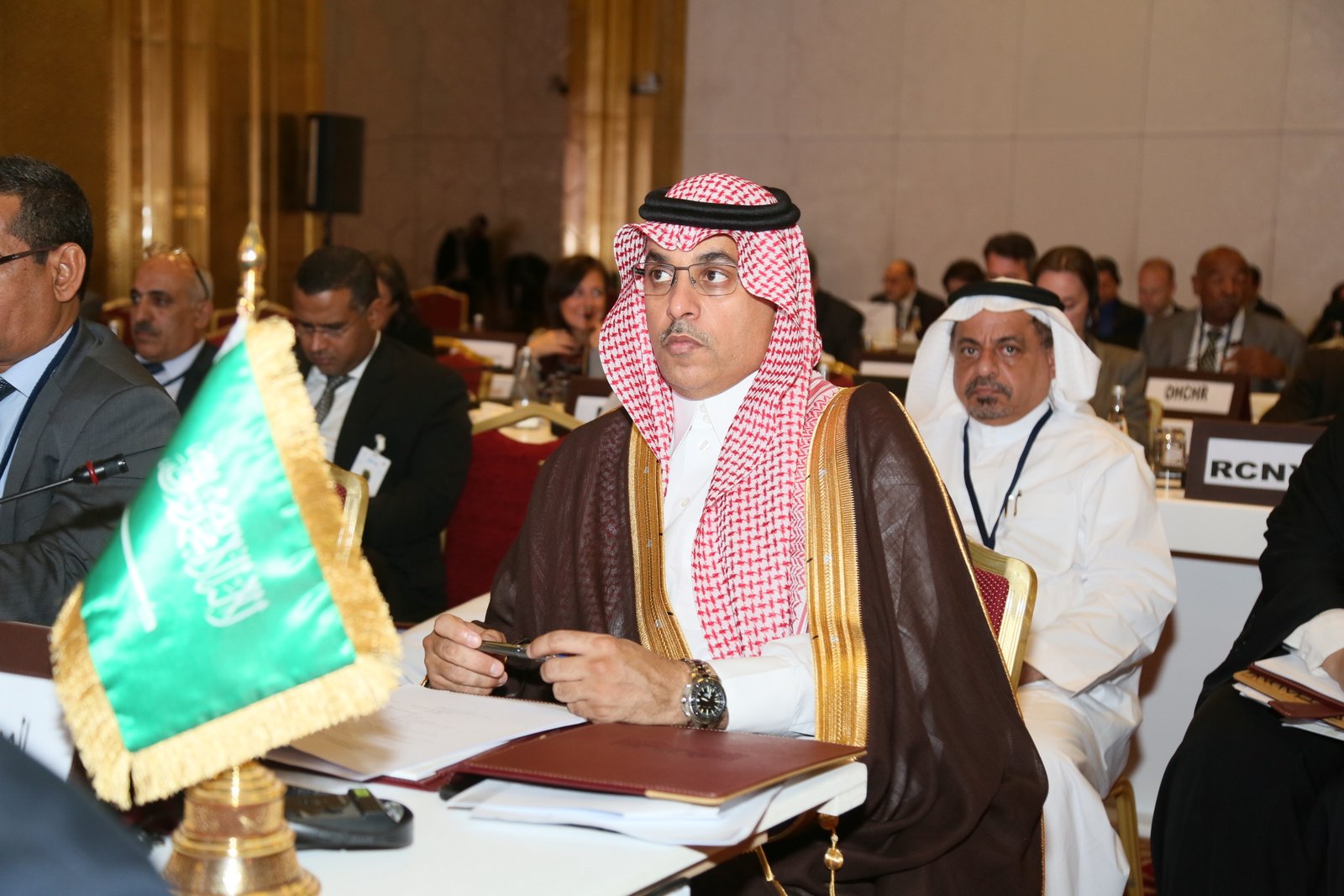
Dr. Altekhaifi: the transition towards a knowledge-based society promotes sustainable development in the Kingdom
As the Chairman of the Saudi Delegation in the ESCWA Ministrial Session
Dr. Altekhaifi: the transition towards a knowledge-based society promotes sustainable development in the Kingdom
H.E. Dr. Fahad Sulaiman Altekhaifi, GaStat President, assured that the Kingdom of Saudi Arabia has completed remarkable steps towards achieving the millennium goals of sustainable development and has developed a strategy for total development under the framework of its 2030 Vision.
This came during the 29th ministerial session of ESCWA entitled "Implementing the Sustainable Development Goals of 2030 in Arab countries", held in Doha,Qatar. HE GaStat President chaired the Saudi delegation participating in this session. He clarified that the Kingdom has made deliberate steps towards achieving the goals of sustainable development, where all conditions are prepared to achieve its goals of growth rates, average income increasing, promote the transition towards a knowledge-based society. This can be made through multiple strategies such as those based on economic diversification, sovereign investment funds, support the private investment initiatives, invest in quality education, research and development, health facilities, public services, and international and regional agreements. He added that the entire government systems in the Kingdom works on increasing the development of national and regional institutions, and enhance coordination efforts, enhance the flexibility of public institutions in developing governance strategies.
On Tuesday, The United Nations Economic and Social Commission for West Asia (ESCWA) held its 29th session for senior officials, in the presence of representatives from member states and non-member states in international and regional organizations and committees.
ESCWA is one of the five United Nations' regional commissions, and is a part of its general secretariat. It works under the supervision of economic and social council in order to support the economic and social cooperation between the region countries and promotes the development process in order to achieve regional integration.
Its membership compromises of 17 member states which are: Saudi Arabia, Bahrain, Egypt, Iraq, Jordan, Kuwait, Lebanon, Libya, Morocco, Oman, Palestine, Qatar, Sudan, Syria, UAE, Tunisia and Yemen.
The ESCWA ministerial session is held every two years with the participation of the commission member states representatives on the mistrial level and representatives from United Nations' organizations and programs in addition to United Nation member states who are not member of ESCWA.

GaStat: 5,382 photographers work in 2,415 photography studios in Saudi Arabia
Within the new bundle of cultural indicators
GaStat: 5,382 photographers work in 2,415 photography studios in Saudi Arabia
On Sunday, 12 Rabī‘ al-awwal 1438 corresponding to December 11, 2016, GaStat issued its indicator about the number of photography studios and its workers from 2011 to 2015 in all administrative regions of the Kingdom which has reached 2415 studios with 5382 photographer and workers.
The indicator issued by GaStat showed that Makkah region is in the lead by number of photography studios and its workers for the last five years. The number of studios in Makkah region has reached more than 802 in 2015, while Riyadh region is the second largest area after Makkah in the number of operators and photography studios which has reached more than 640 studios with more than 1400 worker in 2015.
GaStat's spokesman Taiseer Almofarrej explained that the photography indicator is considered one of the most important cultural indicators, and it measures the changes in number of shops that photograph people, number of photographers, and number of workers annually. The indicator reflects the development in photography activity in different regions of the Kingdom.
Almofarrej stressed that GaStat was keen to launch its indicator today to cope with the events of "colors of Saudi Arabia forum" to shed light on this activity. He also added that after the launch of any indicator, GaStat begin its assessment in order to develop the indicator with the collaboration of relevant entities. One of these indicators is the photography as one of the most important cultural indicators, in addition to the fact that photography field is one of the attractive fields to work in especially with the development of photography tools and the increasing demand on photographers, and the impact of images on media, art and culture particularly with the spread of social media. Knowing that the indicator does not include amateur photographers or who works independently as the indicator relies on record data from relevant entities.
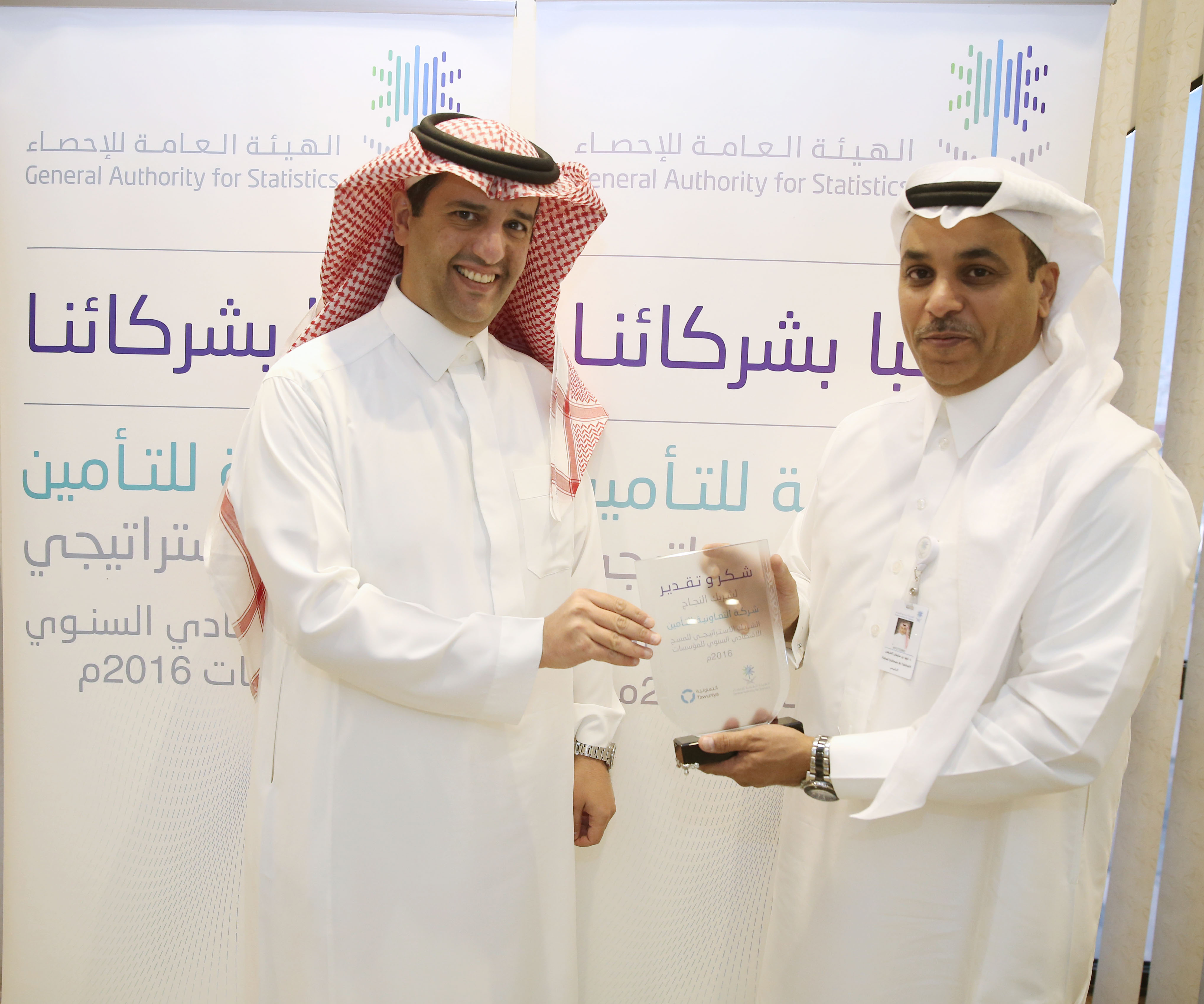
GaStat honours Tawuniya
For its role in raising statistical awareness within the economic survey
GaStat honours Tawuniya
H.E. Dr.Fahad Altekhaifi, the President of the General Authority for Statistics (GaStat), expressed his thanks to Tawuniya insurance company for supporting the operations of the economic survey of establishments (2016) that aim to support statistical awareness programs.
H.E. GaStat President stressed that giving the opportunity for the private sector to sponsor specialized surveys and research comes within the framework of enabling the support of statistical awareness, in which Gastat aims to raise the awareness of any research or study targeted groups to the importance of the information provided and its role in supporting relevant development decisions. He added that the private sector in the Kingdom of Saudi Arabia realizes its societal role and offers a number of supporting initiatives to achieve the goals of government agencies.
Dr. Altekhaifi explained that in this year, GaStat conducted its periodic economic survey through a series of economic research and surveys in order to provide detailed economic data of all establishments in the private and public sector and non-profit organizations to prepare indicators that help in recognizing the economic activities growth rate. More than 650 statistical researchers collected the data of 33,500 establishments in all regions of the Kingdom in order to obtain detailed economic data related to different aspects of the establishment.
Mr. Raed bin Abdullah Al-Tamimi, Tawuniya CEO, expressed pride in the strategic collaboration with GaStat through his visit to GaStat. He clarified that this sponsorship is part of the initiatives of Tawuniya to support the statistical awareness of the Saudi society because of the importance of its results in the development of the private sector. Mr. Al-Tamimi expressed his thanks to Gastat for giving them the opportunity to contribute in achieving the objectives of economic statistical products that supports the economic projects.
Mr. Al-Tamimi added that Tawuniya, as the leading insurance industry in the Kingdom, supports the economic projects especially small and medium enterprises and national authorities to complete the initiatives that have a positive impact on the society and insurance sector. He noted that Tawuniya has a great experience in insurance practices and provides a variety of insurance solutions that meet the needs of all business sectors, drawing attention that this approach is in line with the 2030 Saudi Vision.
Al-Tamimi asserted the importance of providing economic information about economic establishments to support decision makers in drawing a clear roadmap that contributes in implementing the goals and plans of the national transformation program. This program supports the role of economic establishments especially small and medium establishments in the GDP at a rate of up to 25% in 2020, which will contribute to reduce the dependence on oil and diversify sources of income.
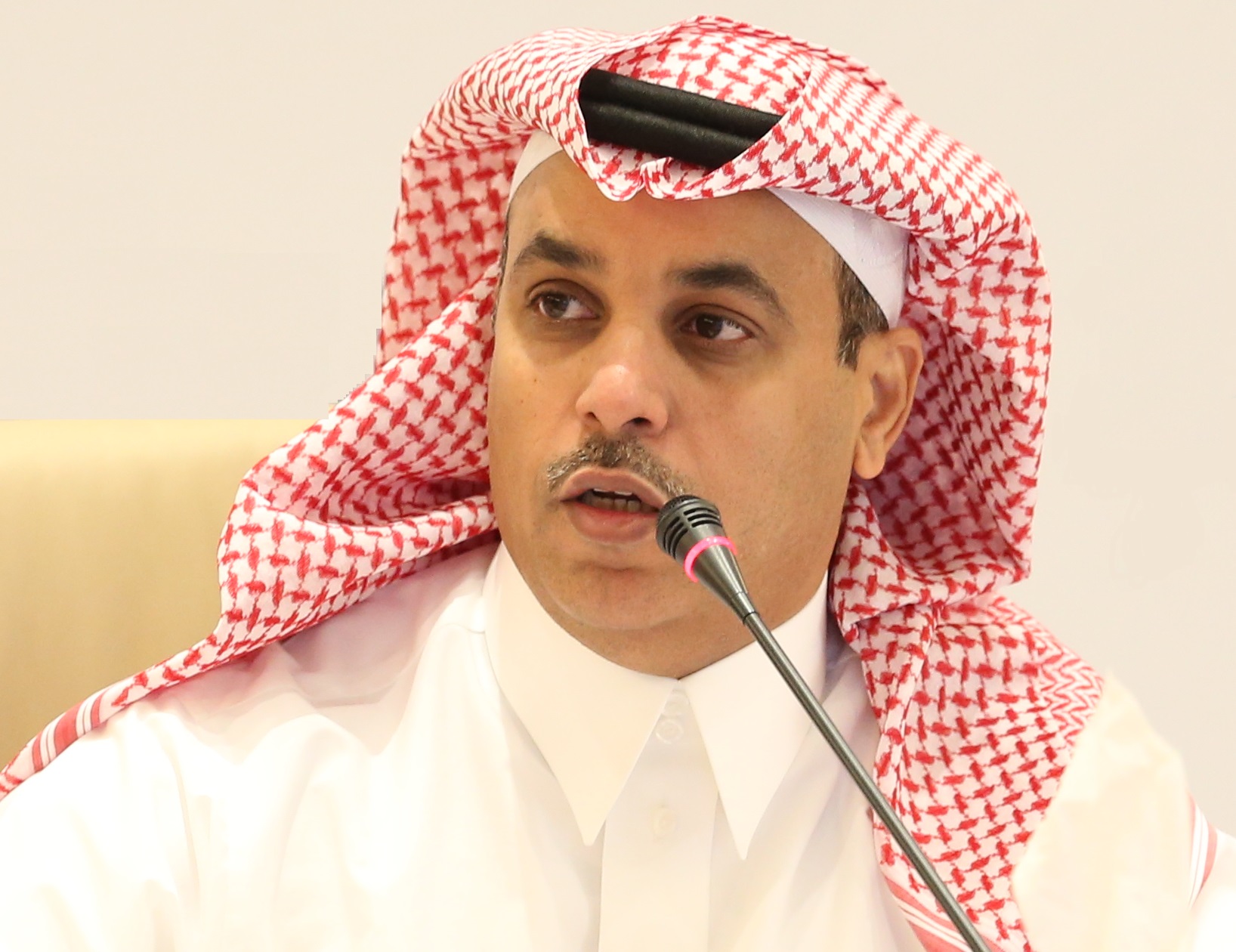
Dr. Altekhaifi: GaStat works on enhancing the national and international collaborations to raise the data quality and support decision and policy makers
Participating with 40 countries in the International Association for Official Statistics (IAOS) conference
Dr. Altekhaifi: GaStat works on enhancing the national and international collaborations to raise the data quality and support decision and policy makers
GaStat participates in IAOS conference 2016 (round 15) Under the Patronage of H.H. Sheikh
Hazza bin Zayed Al Nahyan, Vice chairman of Abu Dhabi executive council. The conference is organized by Statistics Center in Abu Dhabi. The main theme of the IAOS 2016 conference is "The Spirit of Official Statistics: Partnership and Continuous Innovation". The conference activities will conclude on December- 8-2016.
Dr. fahad bin Sulaiman Altekhaifi, GaStat president, said that the authority keeps enhancing its experience and raising the data quality through an integrated program for all local, regional, and international collaborations, in addition to following the best international practices in order to provide comprehensive and high-quality statistical data that support policy and decision maker. He revealed that the strategic collaboration program is an essential part of the statistical sector' strategic transformation program in Saudi Arabia. GaStat worked on preparing a transformation map in the statistical work. This map included a number of projects and initiatives that cope with the 2020 national transformation program and 2030 Saudi vision. The statistical transformation project depended on three main dimensions; quality of statistical products, concentrating on clients, and activating the statistical sector. Using these three dimensions, GaStat went through six main tracks represented in reformulating the authority tendencies in a way that achieves the goals and reflects the clients tendency, reevaluating the products and services provided by the authority, determining the required operating activities to provide products and services according to clients needs, enhancing the technical part in the authority, modifying culture and developing statistical awareness, in addition to assuring the existence of the organizational structure and the governance to make a transformation. Each track has a group of projects and initiatives that are integrated with each other, so that they can contribute in implementing the strategic transformation program. These projects and initiatives aim at activating the statistical part, evaluating the products and services, and developing methodologies, standards, and classifications. This can be achieved after preparing the authority administratively, financially, technically, and systematically to pursue in the transformation process. In addition to raising the statistical awareness and culture among all users of data, information, and statistics.
On the other hand, Dr. Fahad asserted that IAOS conference was held in a time, during which all GCC statistical entities work together to achieve the vision of the custodian of the two holly mosques that enhances integration between GCC countries, improves GCC statistical performance, and meets the leaders expectations. All GCC statistical entities work on supporting the integrated work especially the collaboration between them, so that they can deal with all GCC essential issues.
GaStat participation in this conference represents its belief in collaboration and how it develops the statistical work and raises awareness among all producers and users of data. Moreover, it identifies the importance of official statistics and how they support the developmental resolutions in the region. Altekhaifi clarified that GaStat along with all GCC statistical entities are trying to enhance and develop the concept of official statistics so that they reach an excellent level of efficiency. Furthermore, they enhance the value of official statistics in the information community. They also enhance collaborations, innovation, and national statistical system update.
H.E. expressed his gratitude for the great hospitality of Abu Dhabi in this conference. It is the first country in the region that organizes an IAOS conference, as this conference is held every two years by one of the IAOS members. So, this assured the GCC statistical entities role in the region.
It is worth mentioning that the 15th round of the conference depends on four main aspects, about which all sessions are conducted. The aspects are: enhancing the value of official statistics in the information community, making collaborations to achieve results, innovation and updating national statistical systems, and following the main principals in the statistical work practice.
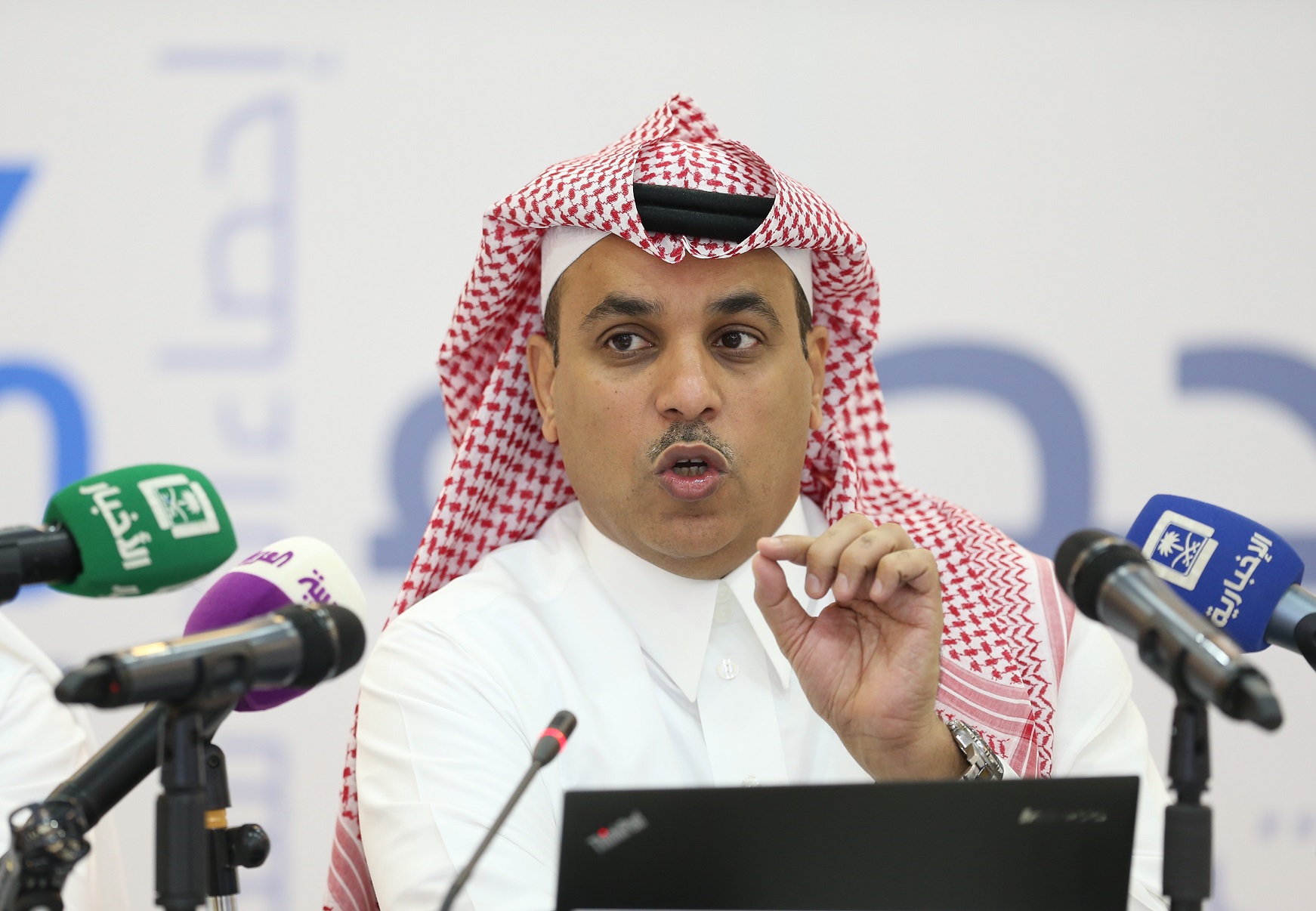
GaStat launches more than 45 new statistical products
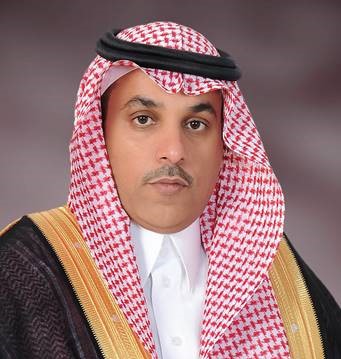
H.E. the President of GaStat appreciates the approval of the Cabinet and confirms the continuation of the statistical work to support development decisions
The application of GOSI's staff regulations and pay scale on the staff of GaStat
H.E. the President of GaStat appreciates the approval of the Cabinet and confirms the continuation of the statistical work to support development decisions
H.E. the President of the General Authority for Statistics, Dr. Fahad Bin Sulaiman Altekhaifi, appreciated the approval of the Cabinet in its meeting on Monday, 30th of Muharram 1438H on the application of GOSI's staff regulations and pay scale on the staff of GaStat.
H.E. expressed his gratitude to His Highness the Custodian of the Two Holy Mosques, King Salman Bin Abdulaziz Al Saud, and His Highness the deputy Crown Prince for the support given to all government entities to achieve its objective in national development. It reflects the care of the prudent leadership for developing the infrastructure of all development resolutions, considering the statistical products and services provided by GaStat as a solid bases to support national development decisions, and support decision makers with information that is considered the compass of development work. H.E. stressed that the application of GOSI's staff regulations and pay scale helps GaStat to adapt to next phase requirements and allows them to attract specialized national talents in the statistical and administrative work in an effort to complete the transformation, which started after the Royal Decree No. (64283), dated 26/12/1436H, approving the transformation from (Central Department of Statistics and Information) into an independent Authority. This transformation helped in enhancing the environment to provide a wider range of statistical information and data and its dissemination to support decision making. Since the Royal Decree issuance, GaStat worked on the preparation of a transformation road map in statistical work including a number of projects and initiatives that are consistent with the 2020 National transformation Program, and the 2030 Saudi Vision.
It is worth mentioning that the modification, on which the cabinet has agreed, was listed as ( the second) item of the cabinet resolution of the General Authority for Statistics organization, number (11) in 13/01/1437 H. The resolution was modified to be as following " except the authority president, GOSI regulations, pay scales, and modifications are applied on GaStat staff". The organization included (17) terms covering a group of organizational rules, the most important of which are: stressing on the authority's legal personality, administrative and financial independency, and asserting that it is the only statistics- concerned entity. Moreover, it is the only official reference that supervises and organizes the statistical work. The authority's affairs are managed by a board that contains (18) entities, (13) of which are government entities including the authority, in addition to the council of Saudi chambers, and two independent statistics specialists. The board is headed by HE minister of economy and planning, and has been given the description of " the dominant authority" which means implementing its resolutions on the level of statistical sector and all its components in Saudi Arabia. The organization has charged the authority with the responsibility of forming a coordination committee that constantly coordinate the statistical work between the authority and the other related entities. The authority will also carry out the responsibility of founding an information central system in the authority that is automatically linked with all concerned entities. Furthermore, the organization included many tasks in addition to implementing the statistical works such as: applying the recognized international standards which include the statistical work methodology, designing and implementing surveys, conducting research and studies, analyzing data and information, documenting data, collecting, recording, classifying, and analyzing statistical data ,which cover all aspects of life in Saudi Arabia, from its different sources either from surveys, censuses, or administrative records in the public and private establishments. Moreover, the tasks include preparing, using, and updating the national statistical guides and classifications according to international standards, preparing and publishing the surveys and researches' statistical reports and bulletins, providing statistical services, conducting surveys, preparing statistical studies and researches to provide the establishments and business sector with statistical data from its databases. In addition to the tasks of exchanging knowledge, providing the entities with recommendations to improve all information systems and statistical work methodology, so that they can have a unified, accurate, and comprehensive statistical system. The tasks also cover raising awareness about the importance of statistics, recording and following any statistics related to Saudi Arabia published by the national and international authorities, and coordinating with the concerned entities.
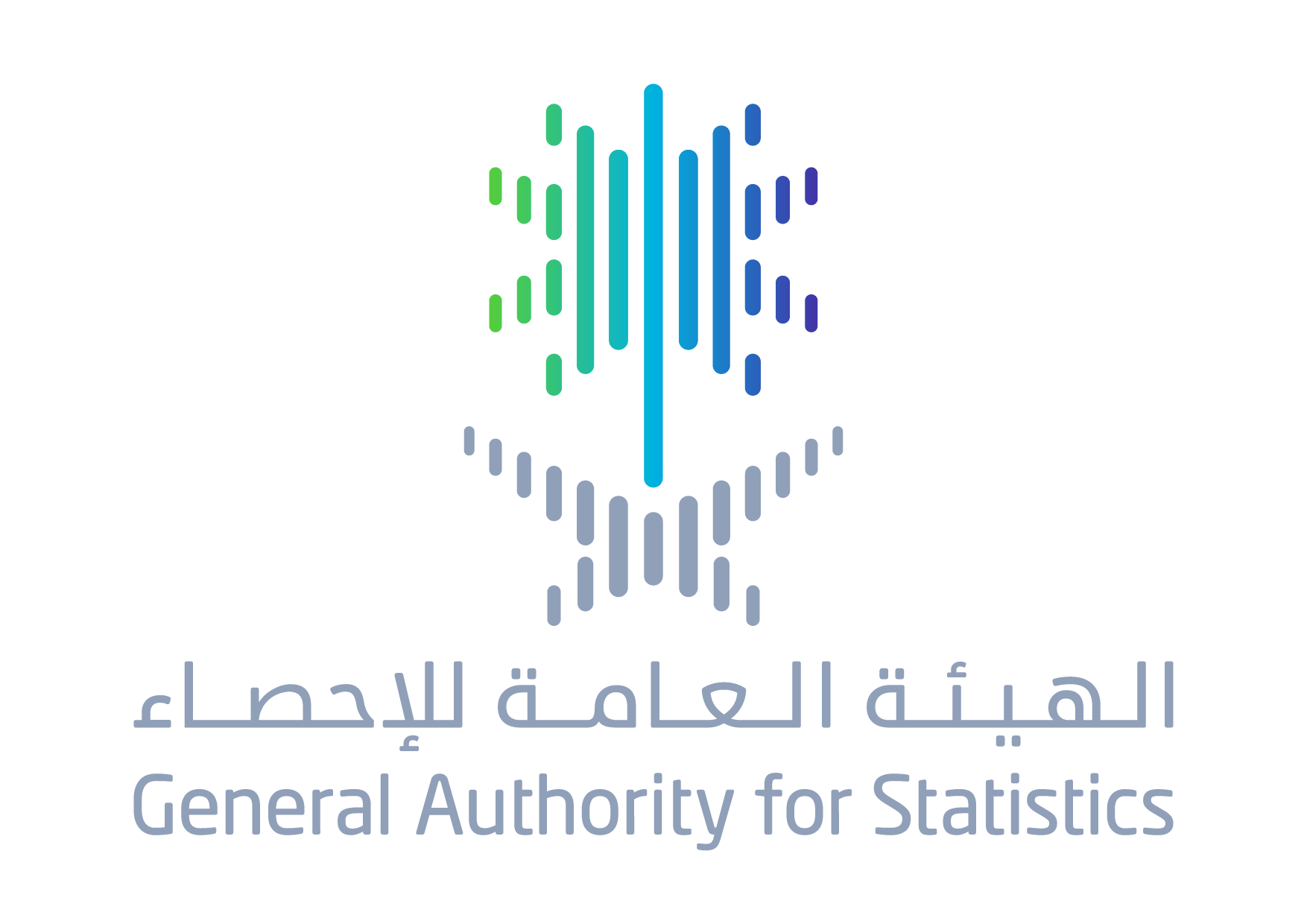
GaStat: Wholesale Price Index Increases in September
GaStat: Wholesale Price Index Increases in September
On Tuesday, the 24th of Muharram 1438 H/ 25th of October 2016 AD, the General Authority for Statistics (GaStat) issued the monthly indicator of Saudi wholesale price index for the month of September. It is now published on its website www.stats.gov.sa . The indicator recorded (163.1) with 0.3% increase in September 2016, compared to last month (August) in which it recorded (162.6).The indicator includes ten main sections; Food and living animals section, beverages and tobacco section, raw materials except fuel, mineral fuel and related products section, Fats and oils section, chemical materials and related products, manufactured commodities classified by material section, transportation equipment and machines section, diverse manufactured commodities section, and other commodities section.The report attributed that increase to the rise of three main sections that constitute this indicator; transportation equipment and machines section with (0.9), Food and living animals section with (0.6%), manufactured commodities classified by material section with (0.1%).On the other hand, six sections have decreased: raw materials except fuel section with (1.4%), diverse manufactured commodities section with (0.4%), beverages and tobacco section with (0.3%), Fats and oils section with (0.3%), chemical materials and related products with (0.1%), other commodities with (0.1%), However, the sections of mineral fuel and related products did not change and remained stable.The authority indicated that the Saudi wholesale index measures the average of change in the prices of commodities and services that are sold in the primary markets. What matters here is the price change only. Therefore, the changes that result from the differences in quality, quantity, shipping method, or any other influencing factor in order to get the net price are excluded. This index is provided to everyone, and conducted all over Saudi Arabia.It is worth mentioning that the wholesale price index is used to record any change in the prices of local or imported commodities. In addition to monitoring the price directions and the status of markets and costs of living. Furthermore, it is used in preparing the national accounts by protecting the income and national aggregates from the influence of price change.
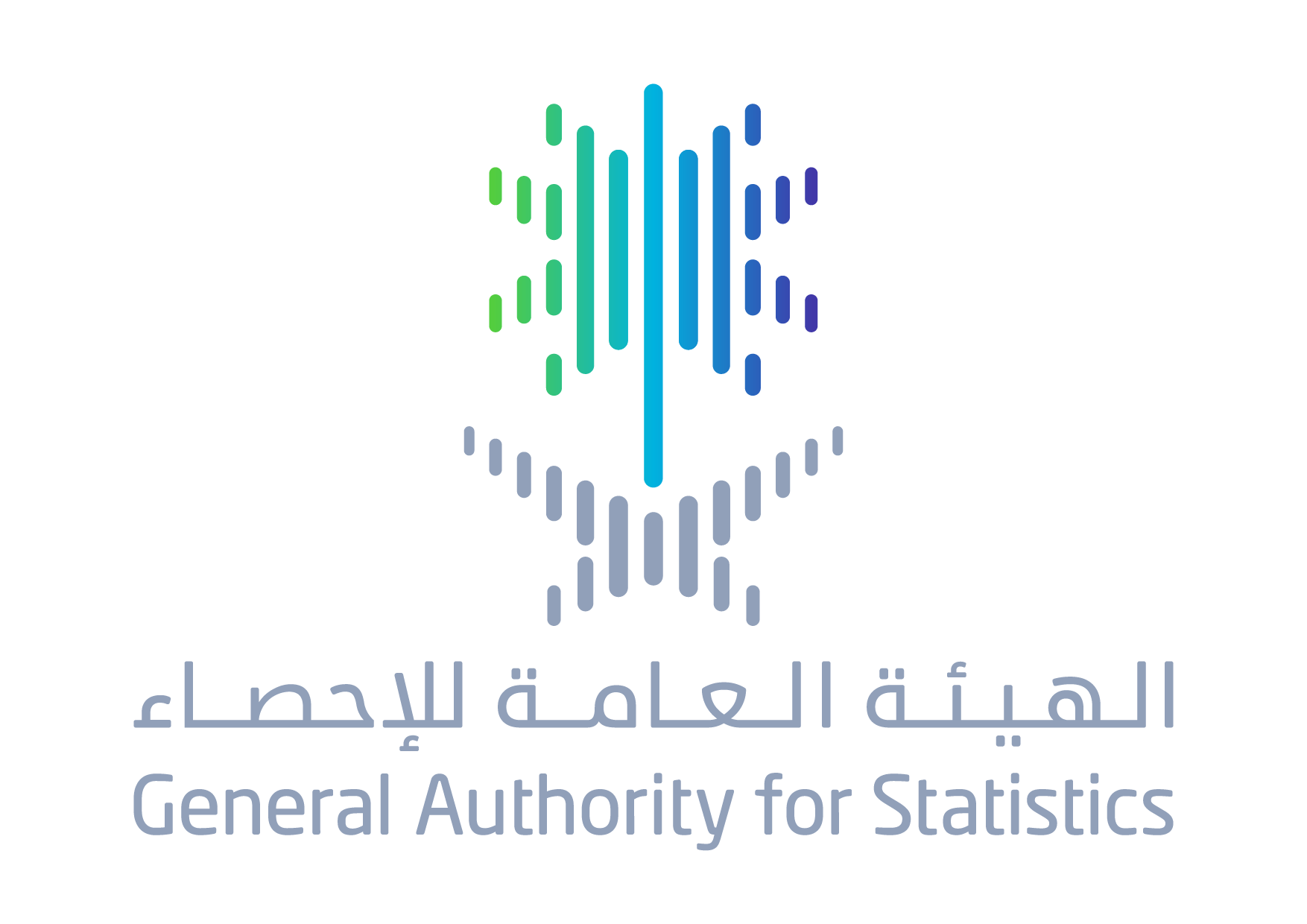
"GaStat" : Cost of Living Index remains stable in September 2016
(6) sections decreased, and (4) rose.
"GaStat" : Cost of Living Index remains stable in September 2016
On Monday, the 23th of Muharram 1438 H/ 24th of October 2016 AD, the General Authority for Statistics (GaStat) issued the monthly indicator of Saudi cost of living index for the month of September. It is now published on its website www.stats.gov.sa .The indicator didn't record any relative change compared to the previous month.The monthly report indicates that the Saudi cost of living index indicator recorded (137.9) in September 2016 without any relative change compared to August 2016. It recorded an increase above (133.9) from September 2015, recording a rise of 3.0% on an annual basis.The report attributed the monthly increase to the rises of four of the main sections that constitute this indicator; clothes and shoes section with (0,7%), food and beverages with (0.3%), telecommunication section with an increase of (0.2%) , and finally, furniture ,appliances, and maintenance with an increases of (0.1%).On the other hand, six sections have decreased; commodities and services with a decrease of (1.0%), restaurants and hotels with a decrease of (0,7%), literacy and recreation with (0.4%), transportation with a decrease of (0,2%), housing, water, electricity, gas, and other types of fuels with a decrease of (0.2%), finally, health section with (0.1%).However, the sections of tobacco and education did not change and remained stable.The cost of living index indicator issued monthly by GaStat aims at providing data about the prices of commodities and services that are in the consumer basket. It also aims at providing data about the cost of living indices within a time series. (The consumer basket) refers to the actual group of commodities and services that are recorded during the household expenditure and income survey. The relative distribution of the commodities and services consumption inside the consumer basket is extracted to make it the base stone in the process of indices calculation. The cost of living indices are used to measure any change in the prices of commodities and services that are purchased by consumer. Moreover, it is used as an accurate indicator that measures the economic inflation and recession. It is also used in statistical and economic analyses that are associated with prices movement and anticipations in different times. Data are collected by conducting interviews. The sources addresses are clarified to the interviewers to facilitate their task. The sources distribution in one city must cover all available commodities and services with all levels.
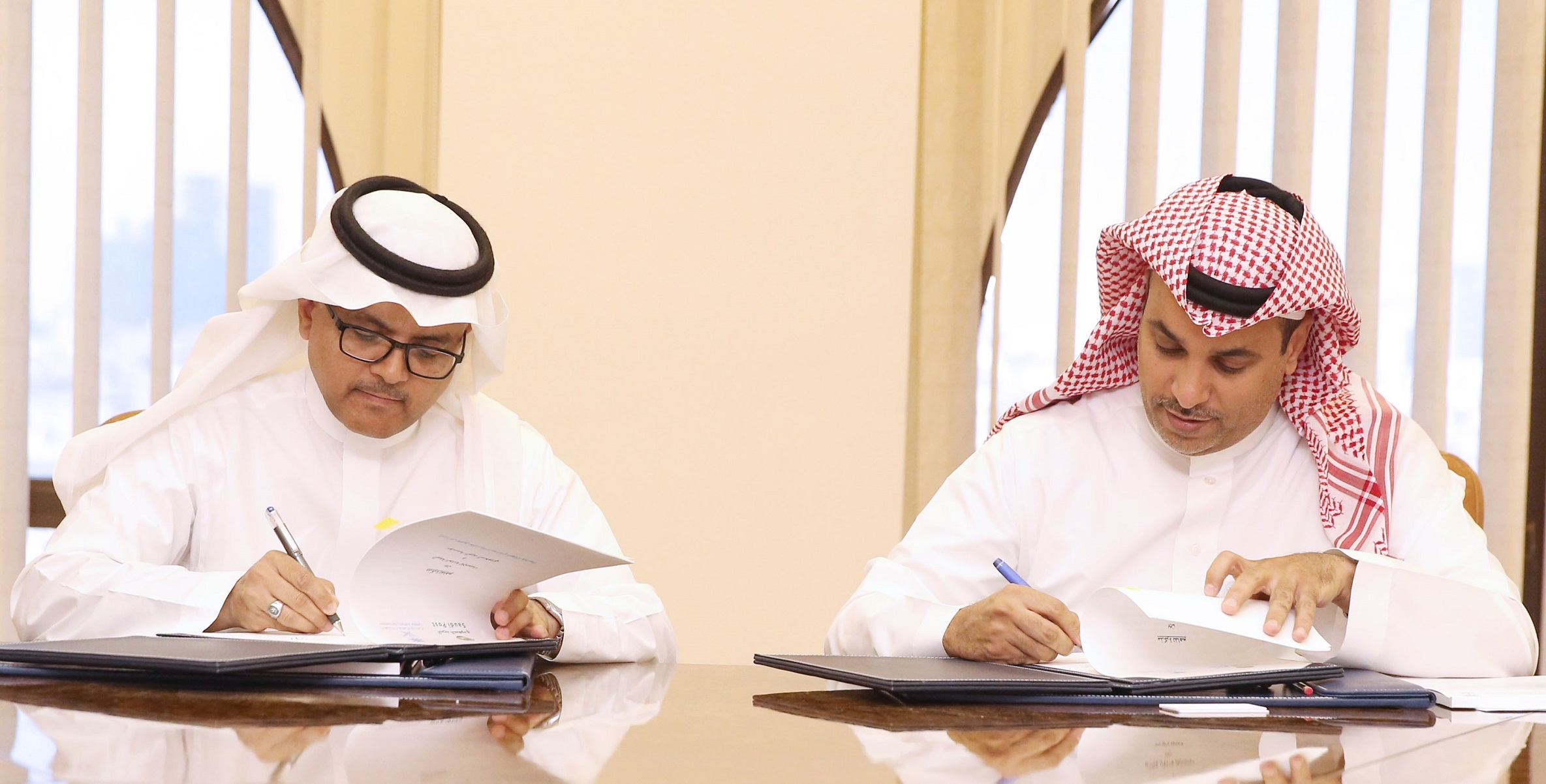
" National Address" Links Data with the Website to Raise Its Quality, and Establishes a Statistics Unified Spatial Reference
GaStat and Saudi Post Institutions Sign a Memorandum
" National Address" Links Data with the Website to Raise Its Quality, and Establishes a Statistics Unified Spatial Reference
GaStat starts using the national address map, which is verified by Saudi post institution, to be the base of the statistical data collection operations. It also links the data of national address in the statistical field operations. On Sunday, 22 of Muharram 1438 H, GaStat and Saudi post institution signed a memorandum to enhance the collaboration between the two entities and activate the use of national address as a geographical base of data and statistics in Saudi Arabia, so that it can be used in the 2020 population and housing census.
Dr. Fahad bin Sulaiman Al-Tukhaifi, president of the General Authority for Statistics, said that the collaboration with Saudi post institution is all about producing and using the geospatial data and link them with the statistical data through surveys and administrative records conducted periodically and regularly by GaStat. The main objective is achieving integration between them to provide high quality statistical products that collaborate in supporting policy and decision makers. He added, unifying the efforts between the authority and the institution in the fields of geographical and spatial data collaborates in unifying the data sources by an updated, certified, and unified Saudi map. In its coming field works either for households or establishments, GaStat will provide statistical data and links them with the national address geographically, so that they can collaborate in providing high quality data in all fields. Dr. fahad clarified that this cooperation includes publishing the statistical data in a way of geographical distributions by using the national address map, and setting unified technical principals between the two entities when dealing with data and raising the statistical awareness.
On the other hand, Dr. Osamah bin Mohammed bin Saleh Altaf, Saudi post institution acting president, indicated that the Saudi post is working on the collaboration with GaStat within the Saudi post institution strategy which shows the Saudi post capabilities in the field of geospatial information and national address for all entities, in addition to providing the statistical data and link them geographically with the unified national address.
Dr. Altaf asserted that this agreement is one of the important agreements that the Saudi post made. It is considered a crucial addition in the field of accurate national statistics publishing through the national address digital maps which use the most recent international techniques.
He added, the Saudi post wants to exchange its experience and provide its services after building a national organization of the standard addresses of every Saudi location and building by using the most recent techniques, geographical information systems, and addresses standards and principals. He stressed on the importance of using the national addresses as they are considered a base infrastructure that all government electronic services and commerce rely on, so that citizens and foreigners all over Saudi Arabia get benefited from its programs.
